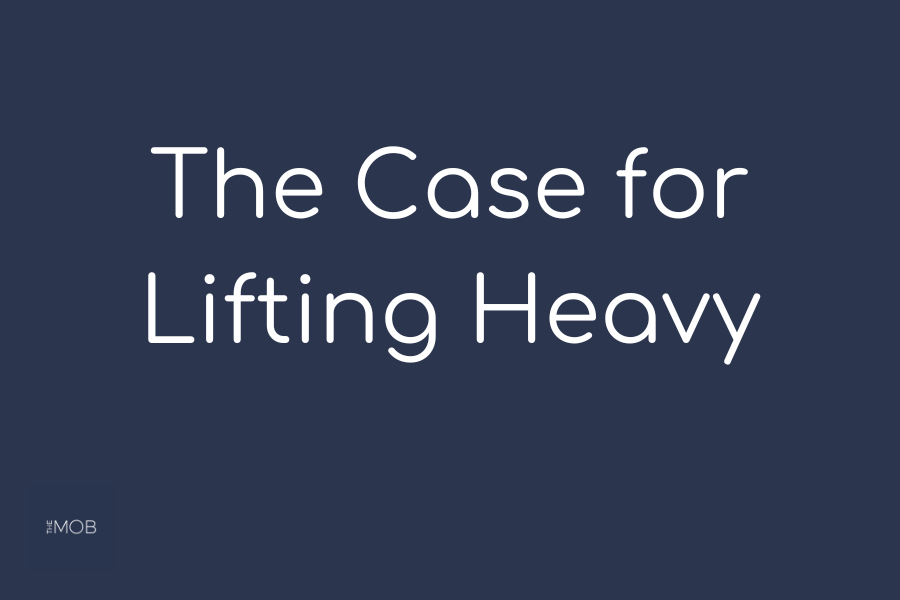Is Lifting Weights Bad for You? (the case for lifting heavy)
Is Lifting Heavy Weights Bad for you?
The short answer is no.
And the question should be:
“Why NOT lift heavy weights?
The Neurological Component of Strength Training
When you start resistance training, you gain muscle strength before you gain muscle mass. What’s the difference? It’s a neurological process. Muscle hypertrophy (gaining muscle mass) refers to the size of your muscle fibers getting larger. However, muscle strength represents how efficiently your brain communicates with your muscles and your muscles respond. The first 3-6 months of strength improvements from training generally come from an increase in neurological efficiency, aka muscle strength, rather than an increase in muscle size. How cool is that??
When we’re talking about efficient communication between the brain and the muscles, we’re talking about motor units. Motor units are nerve cells responsible for signaling the contraction of various fibers within each of your muscles. Each motor unit innervates a group of muscle fibers. It first receive signals from your brain and follows through by contracting those fibers in its "group".
What Lifting Heavy Weights Offers You that Lifting Light Doesn’t
We only use the necessary amount of motor units required for the task. Small tasks like lifting a glass of water don't require many motor units.
When we lift really heavy things though, our brain send a signal to recruit more motor units in the muscles to get the job done. Over time with intentional training, this means we adapt and learn how to produce more force. Lifting heavy doesn’t create more motor units, it just makes us better at using the ones we already have which remain untapped if we don't engage in activities required to use them. Again, our bodies like to conserve energy as a survival mechanism, so we’re not going to put in more effort to do something unless it’s required. Heavier load is key to requiring us to use untapped motor units. (Force production is a nuerological skill. I wrote a blog post a week ago about movements as skills.)
Why should you care? (Because lifting weights isn’t bad for you! It’s actually really important!)
As we age, lifting heavy helps preserve our neurological integrity -- our ability to keep and effectively use as much of our muscle fibers as we can. The more muscle capacity we have in reserve as we get older, the more of a buffer we have in case we get sick, undergo surgery, or bounce back from a fall (not to mention being able to do all the things we love to do with more ease!)
We want to preserve these motor units, because we can't create more than what we have, but we CAN lose them! The motor unit nerves that innervate our muscles may degenerate and the motor neuron itself may die off. This leads to atrophy of the muscles they used to control and/or a “re-purposing” of the muscle fibers that do survive, to be lumped with other existing muscle fibres (this decreases the ability to produce force and decreases our control of our movements).
TLDR
The Bad News: If you're currently strength training with light weights, that's a great start! But you will still lose motor units and muscle capacity over time because those parts of your body are not being accessed. (Maintenance isn't really a thing. You're either gaining strength or losing it. So, if you're not actively gaining it . . . you are in fact losing it).
The Good News: Research shows us that it’s truly never too late to start training the motor units we still have! (Did you read the NYT article mentioned above? Buzsard was 74 years old and found herself struggling to get off the ground. 10 years later she's picking up 170lb off the floor.)
What constitutes a heavier load? Here’s a guideline: for these processes to really kick off, we’re looking at a weight you can lift only 3-5 times in a row. If you can lift a weight during an exercise 10 times, it’s likely not heavy enough to force untapped motor units to be recruited.
*Note: Power training is another great way to recruit more motor units, and can actually be less intimidating than lifting heavy weights. But one isn’t a substitute for the other, both are needed.
**Note: The above is generalized to a broad range of people. If you have chronic pain, neurological challenges, or systemic syndromes like chronic fatigue, the road to heavy lifting might feel inappropriate or dangerous. However the research on the benefits of heavy lifting have spanned across countless categories of health issues including Parkinson’s, pelvic organ prolapse, menopause, fibromyalgia, osteoporosis, osteoarthritis, low back pain, depression and anxiety. When done progressively, with care, and with support, it can be a life changing tool.
Start Lifting Heavy!
Instead of wondering if lifting heavy weights is bad for you or if you should lift heavy weights, you might start to ask, is there a reason you shouldn’t? If you answered with:
“I’m nervous.”
“I’ve injured myself before”
“I don’t know how much I can or should lift."
"I have one of those health issues you mentioned and I'm not sure how to start."
then you might need a coach . . . you know how to reach me :)
If you’re sold and ready than it’s time for you to join The MOB and begin your strength training journey.
Till next time, keep moving. alia
Related Reading:
Lifting Heavy Things
A Case for Intense Physical Exertion
"No Pain, No Gain” is Still Kind of True

